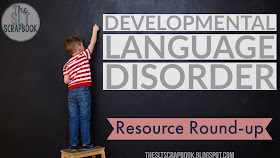Pages
▼
Friday, 22 September 2017
Developmental Language Disorder- A Resource Round-Up
Today, 22nd September 2017, is DLD Awareness day.
DLD, or Developmental Language Disorder is nothing new, but it is the new, internationally agreed term for Specific Language Impairment. But, you may be wondering what is in a name, and why did it need to change?
I've gathered together a range of videos, blog posts and useful information to help you make sense of this new term and to give you ideas of where to go to find out more information.
Why Did it Need to Change?
In Speech and Language Therapy, we have a range of terms which we use to describe children's speech, language and communication difficulties. For a long time, there were a few different terms used to describe difficulties with language skills; sometimes these terms were used interchangeably, despite them not always being the most accurate, and this caused confusion within the field which impacted on research and awareness. In 2016, a group of experts in a range of fields came together to agree a consensus on a term for children with language disorders, and agreed on the term Developmental Language Disorder.
This video of Professor Dorothy Bishop shares more information about this process, as part of the RADLD Campaign.
What is DLD?
As the video explains, DLD, or Developmental Language Disorder, is the new term to be used for language disorders that:
* Cause severe language problems that interfere with communication in everyday life and/or affect educational progress
* Are likely to persist over time rather than spontaneously progress
* Occur in the absence of a specific biomedical condition, such as autism spectrum disorder, a brain injury or Down Syndrome.
Why is There an Awareness Campaign?
As explained above, this communication difficulty is not new, but it has been misunderstood for a long time. The RADLD campaign wants to raise awareness of these three key messages about DLD:
* DLD means that a child (or adult) has difficulties with understanding and/or using language
* DLD is a hidden condition but is surprisingly common (it is estimated that there are 2 to 3 children in every class with DLD)
* Support can make a huge difference to children with DLD.
This video by Eddie and Dyls explains a little bit more about DLD and the campaign:
Where Can I Find Out More?
If you'd like to share this information with colleagues, head over to the NAPLIC website, which has a useful PDF that explains the 3 key facts.
If you're on Twitter, be sure to use the hashtags #DevLangDis and #DLD123 to find tweets and more information all about DLD.
This post by Adoption: The Bear Facts gives some great information from the perspective of an SLT and parent of a child with DLD which is definitely worth a read too!
To see more useful videos like the ones I've included above, head to the RADLD YouTube Channel- full of videos about strategies to support children with DLD
Are you keen on finding out more information? Head over to SpeechBlogUK to read more information about strategies for children with DLD and then follow the blog hop to see even more useful resources all about DLD!
Are you getting involved with the DLD Awareness Day Campaign? Why not save this pin so you can share it with your colleagues.




No comments:
Post a Comment
Please note, when you submit a comment we receive details of your Google account name. This information is visible on our site for other users to see also.
See the About/Disclaimer section for details about the data we collect and how this is used.